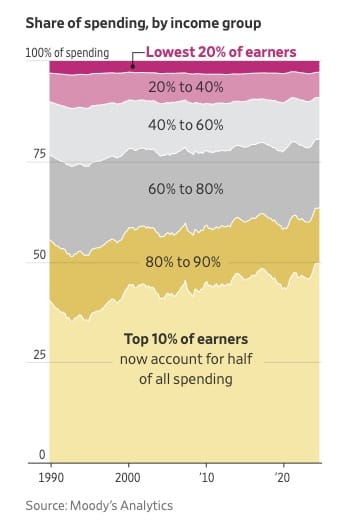February 24 2025
Musk email stirs chaos; Rich fuel spending surge; Apple bets big on U.S.; China ships, RNC hacked; Israel cease-fire in question

1. Elon Musk’s Email Sparks Tension With Trump Cabinet Leaders
2. Wealthy Americans Drive Economy Through Record Spending, Highlighting Economic Divide
3. Apple Pledges $500 Billion, 20k Jobs, New TX Factory After Trump Talks
4. U.S. Targets Chinese Ships with Fees, RNC Hacked
5. Israel-Hamas Cease-Fire Teeters as Truce Nears End
February 24, 1917: Zimmermann Telegram presented to U.S. ambassador
GET THE CITIZEN JOURNAL APP - FREE!
FLASH…Trump fires Chairman of Joint Chiefs of Staff, top US military officer…German center-right alliance won German elections…populist right-wing party Alternative for Germany (AfD) came in second, doubling its share from the last election in 2021…ruling Social Democrats crashed to their worst result since WW2…Trump appoints conservative podcaster Dan Bongino to #2 job at FBI…
1. Elon Musk’s Email Sparks Tension With Trump Cabinet Leaders
Elon Musk’s demand that all 2.3 million government workers justify their work prompted confusion and resistance on Sunday, as several government agency leaders told their staffs not to reply to a mass email requesting bullet-point summations of their accomplishments. Director of National Intelligence Tulsi Gabbard instructed personnel in U.S. spy agencies not to respond, according to the text of an email she sent to the workforce on Sunday, citing the agencies’ sensitive and classified work. Defense Department employees were given similar instructions to not respond, as were FBI personnel and Department of Homeland Security employees. The latest directives come as employees and leaders alike across the government were caught off guard by an email sent Saturday titled: “What did you do last week?” It commanded federal employees to “reply to this email with approx. 5 bullets of what you accomplished last week and cc your manager,” according to a copy obtained by The Washington Post. It gave employees a deadline of 11:59 p.m. Eastern time Monday. The email left many worried, others defiant and still others stunned. The resistance, which grew throughout the weekend, came even from some top administration officials selected by President Donald Trump. Employees at the Cybersecurity and Infrastructure Security Agency were told definitively to reply — a few hours before DHS sent a note saying the opposite. In some parts of the National Oceanic and Atmospheric Administration, staffers received instructions to draft a response but not send it yet. At other agencies, such as the Department of Health and Human Services, employees were first given one instruction only to be emailed later to pause and watch for more guidance Monday.
Article Source: WaPo
2. Wealthy Americans Drive Economy Through Record Spending, Highlighting Economic Divide
Many Americans are pinching pennies, exhausted by high prices and stubborn inflation. The well-off are spending with abandon. The top 10% of earners—households making about $250,000 a year or more—are splurging on everything from vacations to designer handbags, buoyed by big gains in stocks, real estate and other assets. Those consumers now account for 49.7% of all spending, a record in data going back to 1989, according to an analysis by Moody’s Analytics. Three decades ago, they accounted for about 36%. All this means that economic growth is unusually reliant on rich Americans continuing to shell out. Mark Zandi, chief economist at Moody’s Analytics, estimated that spending by the top 10% alone accounted for almost one-third of gross domestic product. Between September 2023 and September 2024, the high earners increased their spending by 12%. Spending by working-class and middle-class households, meanwhile, dropped over the same period.

Article Source: WSJ
3. Apple Pledges $500 Billion, 20k Jobs, New TX Factory After Trump Talks
Days after its chief executive met with President Trump, Apple said on Monday that it planned to spend $500 billion in the United States over the next four years, hire 20,000 people and open a new factory in Texas to make the machines that power the company’s push into artificial intelligence. “We are bullish on the future of American innovation, and we’re proud to build on our longstanding U.S. investments,” Tim Cook, Apple’s chief executive, said in a statement. Mr. Cook met with President Trump last week. After that meeting, Mr. Trump said that the company would shift production to the United States: “They’re going to build here instead because they don’t want to pay the tariffs,” Mr. Trump said in a speech to a gathering of governors. Most iPhones are manufactured in China by the Taiwanese electronics giant Foxconn. Earlier this month, U.S. tariffs of 10 percent on all Chinese products took effect. Levies on imports from Canada, Mexico and other major trading partners could be imposed in the coming weeks.
Article Source: NYT
4. U.S. Targets Chinese Ships with Fees, RNC Hacked
A. The U.S. trade war with China is escalating beyond tariffs with a plan by the Trump administration to impose steep fees on Chinese shipping companies and any Chinese-built vessels that enter U.S. ports. The proposal, unveiled on Friday by the office of the U.S. Trade Representative, would impose millions of dollars in new fees each time one of these vessels enters a U.S. port, adding costs that would likely be passed down to U.S. importers and exporters through higher freight rates. Chinese shipyards accounted for more than half of the cargo ships, tankers and other ocean vessels that were built in 2023 to ferry goods across the seas for everyone from Amazon to Volkswagen, as well as U.S. farmers and energy producers.
B. As the Republican National Committee was gearing up for its convention in Milwaukee, it was also quietly dealing with a serious security breach of its internal communications by hackers with ties to the Chinese government, according to people familiar with the matter. In early July, Microsoft reached out to top party officials to inform them that the hackers had for months had access to the RNC email system, the people said. The previously unreported breach is revealed in reporter Alex Isenstadt’s forthcoming book, “Revenge: The Inside Story of Trump’s Return to Power.” The Wall Street Journal viewed an excerpt of the book, which will be released next month, and verified the hack. RNC officials believed the hackers wanted inside information about how the GOP was planning to address Taiwan in its party platform, the people said. In 2016, the RNC called for a free-trade agreement with Taiwan as part of its 60-page platform. But the 2024 platform, which was released in the run-up to the convention, was whittled down to just 16 pages. There was no mention of the island.
Article Source: WSJ
5. Israel-Hamas Cease-Fire Teeters as Truce Nears End
When Israel and Hamas agreed to a six-week cease-fire in January, there were hopes that it would evolve into a longer and more stable truce. Now, those hopes are dwindling. Both sides have accused each other of breaking the terms of the existing deal, which have allowed for the exchange of Israeli hostages and Palestinian prisoners. Over the weekend, Israel delayed the release of several hundred prisoners, protesting the humiliating manner in which Hamas had paraded hostages before handing them over. With just days before the current truce elapses on Sunday, the sides have yet to begin negotiations for an extension. Steve Witkoff, the Mideast envoy for the Trump administration, said he would return to the region on Wednesday to push for a new truce. While a brief extension is possible, the likelihood of a long-term arrangement — preventing the revival of fighting — seems remote.
Article Source: NYT
February 24, 1917: Zimmermann Telegram presented to U.S. ambassador
The Zimmermann Telegram was a secret diplomatic message sent by German Foreign Secretary Arthur Zimmermann to Mexico in January 1917, during World War I. At this time, the United States was neutral in the war, but Germany was worried that American ships delivering supplies to Britain would help the Allies win. In the telegram, Germany made a shocking proposal: if Mexico joined Germany in the war against the United States, Germany would help Mexico reclaim its "lost territories" of Texas, New Mexico, and Arizona, which Mexico had lost to the U.S. in the 1840s. British intelligence intercepted and decoded the telegram, then shared it with American President Woodrow Wilson. When the message became public, Americans were outraged that Germany would secretly plot against their country while pretending to be friendly. The Zimmermann Telegram, combined with Germany's return to unrestricted submarine warfare against American ships, helped convince many Americans to support entering World War I. Two months after the telegram became public, in April 1917, the United States declared war on Germany and joined the Allied Powers, playing a crucial role in their eventual victory in 1918.
Editors note: consider how the US reacted to the Zimmerman Telegram (entered WW1) when considering how Russia views Ukraine
See the Ad Astra Podcast! Released on Apple and Spotify around 10a CST.
Sponsors (click me!)









Sources
2. https://www.washingtonpost.com/nation/2025/02/23/musk-email-government-agencies/
3. https://www.wsj.com/economy/consumers/us-economy-strength-rich-spending-2c34a571?mod=hp_lead_pos7
4. https://www.nytimes.com/2025/02/24/business/apple-500-million.html?smid=nytcore-ios-share&referringSource=articleShare
5. A https://www.wsj.com/business/logistics/u-s-to-hit-chinese-ships-with-hefty-port-fees-1894a61c?mod=hp_lead_pos10
B https://www.wsj.com/politics/national-security/china-rnc-hack-us-election-48890e7b?mod=hp_lead_pos11
6. https://www.nytimes.com/2025/02/24/world/middleeast/israel-hamas-gaza-ceasefire.html
